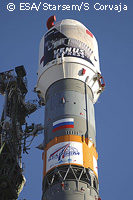Venus Express successfully launched
Europe's second planetary probe, Venus Express, is now en route to its final destination some 350 million kilometres away, following a successful launch from the Baikonur Cosmodrome in Kazakhstan at 04:33 CET on 9 November. A virtual twin sister of the Mars Express probe currently orbiting the Red Planet, Venus Express is due to reach its target next April, when it will begin a detailed study of the structure, chemistry and dynamics of the planet's famously hostile atmosphere. According to a statement from the European Space Agency (ESA), contact was established between Venus Express and the European Space Operations Centre in Darmstadt, Germany, approximately two hours after lift off. Mission controllers say the probe has correctly oriented itself in relation to the Sun and deployed its solar arrays, and that all on-board systems are operating perfectly. The director general of ESA, Jean Jacques Dordain, said of the launch: 'With Venus Express, we fully intend to demonstrate yet again that studying the planets is of vital importance for life here on Earth. To understand climate change on Earth and the contributing factors, we cannot make do with solely observing our own planet. We need to decipher the mechanics of the planetary atmosphere in general terms.' He added: 'Originally, Venus and the Earth must have been very similar planets. So we really do need to understand why and how they eventually diverged to the point that one became a cradle for life while the other developed into a hostile environment.' Following further checks to confirm that the probe and its instrument payload are working correctly, the spacecraft will be 'mothballed' during its long journey to Venus, when contact with Earth will be reduced to once daily. If needed, says ESA, trajectory correction manoeuvres will be made at the half way stage in January. Venus Express is carrying seven onboard instruments, three of which are identical to those on Mars Express, two are from the comet-chaser Rosetta, while two others have been specifically designed for the mission. Together, they will collect data on the characteristics of the atmosphere, its circulation, structure and composition in relation to altitude, as well as its interactions with the planet's surface and the solar wind. The spacecraft, which has a mass of 1240 kg, was developed for ESA by an industrial consortium led by EADS Astrium, and featuring 25 principal contractors from 14 different countries. The director of ESA's science programmes, David Southwood, concluded: 'The launch of Venus Express is a further illustration of Europe's determination to study the various bodies in our solar system [...] with a view to eventually rounding off our initial overview of our immediate planetary neighbours with the BepiColombo mission to Mercury to be launched in 2013.'
Countries
France



